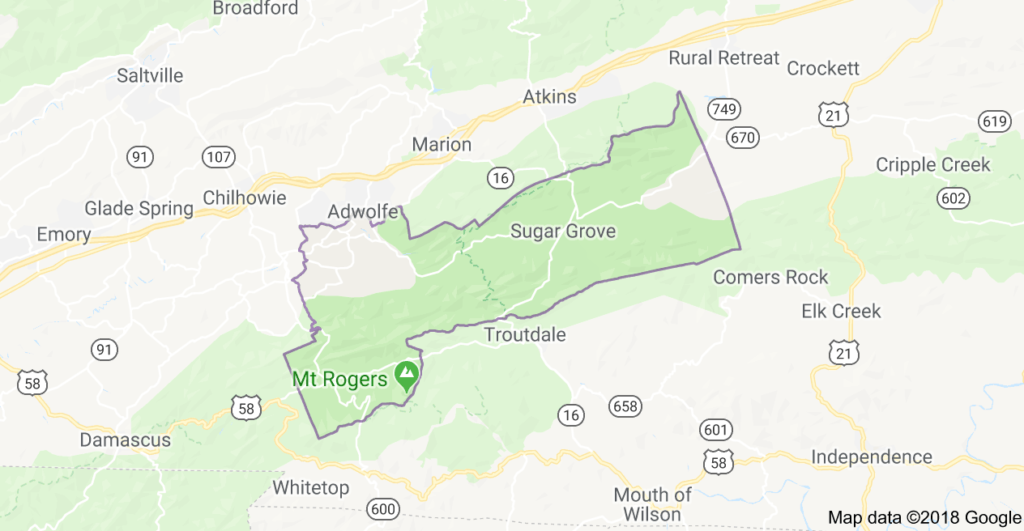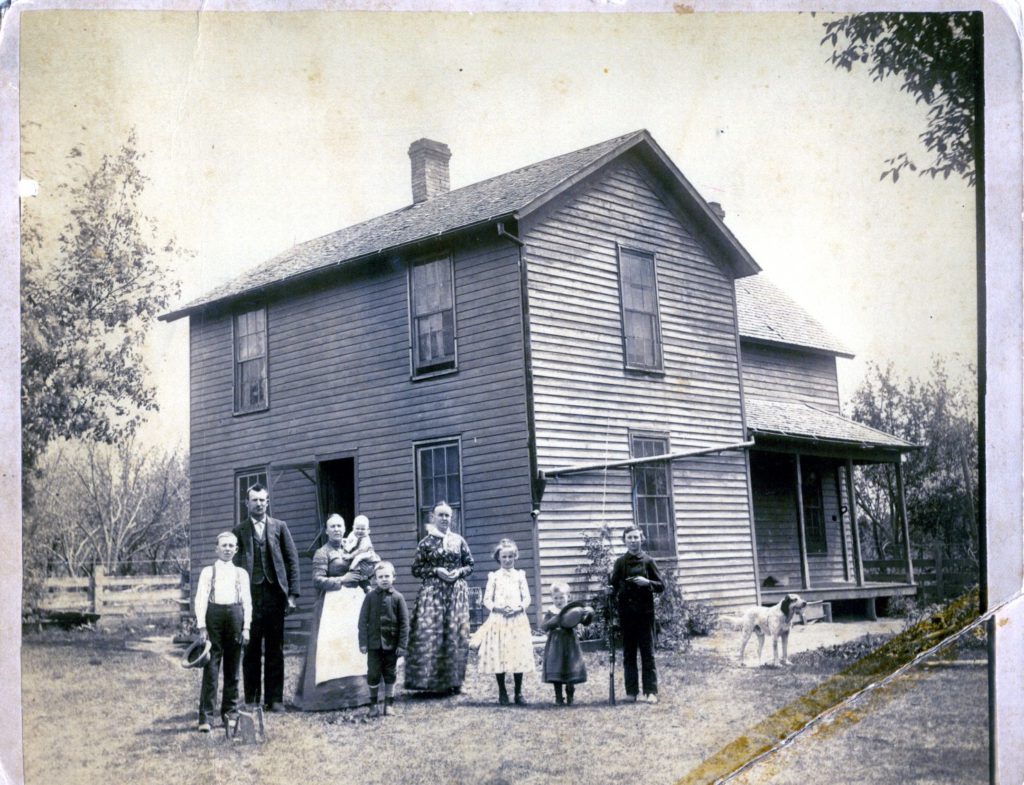John Franklin Pierce was born January 1, 1843, at Sugar Grove, Smith county, Virginia. He was the eldest son of Alexander and Nancy K (Shaver) Pierce, pioneer settlers of Rye Valley, VA.
1840 to 1860 was a time of prosperity for Smyth Co. VA. Smyth County is a land of rivers and valleys. These river bottom areas provided rich soil deposits that make Smyth County a historically significant agricultural area. The names of the valleys reflect the agricultural use of the county. Rich Valley to the north is so named for it’s rich soil and the Rye Valley to the south is named for the abundant rye grasses found growing there. Plainly stated “the oldest and most important industry of Smyth County is farming and grazing”, of which John’s upbringing was clearly engrained.
Agriculturally, Smyth County was established more as family farms than as part of the plantation system prominent in other parts of Virginia. Smyth Country was outside the limits of the “major tobacco producing district” in Virginia. This would account for the relatively low slave population of the 1860 census. Tobacco was grown before the establishment of the County but declined after the creation of Smyth.

EDUCATION
Education in this frontier was the private responsibility of the family. The wealthier families usually employed private tutors thus John’s early education was received from private instruction by tutors who were employed by the planters of the Valley.
THE CIVIL WAR
John’s school days were limited, owing to the breaking out of the Civil War. Every boy large enough to carry a musket was armed in defense of the Old Dominion. and he enlisted in the Home Guards of Virginia.
The Home Guard was any of several loosely organized militias in various states that were under the direction and authority of the Confederate States of America during the American Civil War.
Confederate Home Guard units worked in coordination with the Confederate Army, and were tasked with both the defense of the Confederate home front during the American Civil War, as well as to help track down and capture Confederate Army deserters. The Home Guard was a type of militia for the Confederacy. It had a rank structure and did have certain regulations, whether those were enforced or not.
Home Guard units were, essentially, to be a last defense against any invading Union forces. They also were used at times to gather information about invading Union forces troop movements, as well as to identify and control any local civilians who were considered sympathetic to the Union cause. They received no military training, and although they could be drafted into the Confederate service if need be, there are only a few cases in which that happened. The Home Guard was recognized as a type of service to the Confederacy. It was often made up of older planters or others exempted from front line service. What John’s reason for exemption was can only be queried as the true reason is not known. My belief is that it could have been due to his religious beliefs as the Pierce family was mostly Quaker.
The Home Guard of Rye Valley was established in December of 1860 to patrorl and keep order in the county. Various volunteer companies immediately began to form, including the “Smyth Blues” from Marion, the “Smyth Greys” from Rich Valley, “Jackson’s Old Division” from Seven Mile Ford, and the “Smyth Dragoons” from Marion to name a few. At this point is only my guess that John was in the “Jackson’s Old Division”.
Smyth County became and important strategic point during the war because the saltworks were the primary source of salt supply open to the Confederate Army. Salt production was carefully rationed and each state in the Confederacy had it’s own furnace.
AFTER THE WAR
At the close of the war John went west to Illinois and was engaged in handling live stock for an English syndicate. In the 1870 Census John’s address is listed to be Cartwright, Sangamon, Illinois shortly after he was transferred to Missouri, where he built up a ranch system for his company, but, owing to the rapid settling up of the country, the ranches were sold to settlers and he moved to Clay, Atchison county, Missouri where he completed his energetic and useful life. Many acres of land he reclaimed from the wilderness and his was the hand that hewed, and broke and planted to crops much of the fertile soil he owned. He was a pioneer whose sword was beaten to a plow- share and who aided and witnessed the marvelous up-building of his commonwealth since the war between the States.
As a general farmer and stock-man he succeeded well, for he had ambition, energy and boundless industry, added to good judgment and perseverance. His broad acres, spacious farm buildings, number of farm conveniences and prosperous condition all bespeak a man of no mean ability.

He reared a large family giving them many advantages. Every comfort and convenience that could be procured was obtained for the happiness of his wife Alice. He was married, January 18, 1874, at Rockport, Missouri to Miss Alice Roena Johnson the only daughter of Daniel and Sarah (Hays) Johnson. To this union were born five sons and three daughters namely: Chas. S: Lon J., of Pittsburg, Pa; Mrs. Geneva A. Vogel of Valentine, Neb.; Venus V., Zane F., Reno M., Mrs. Charlotte M Raubach, of Valentine, Neb., and Sallie D.
John was among those sterling men who came west in an early day, virile and strong in mind and body, and built up the country by developing its God-given resource-a direct opposite of so many young men of today, full of schemes for easy living, regardless of their work in the world.
In character he was kind, sympathetic and nearly always cheerful, with and honor that was unimpeachable. Truly, his greatest legacy to his children was what he was and not what he possessed.
At the time of his death he was the grandfather to two grandchildren – Donald W. Pierce and Iva Mae Vogel. Several more were to follow namely: Barbara Mai, and Sara Ann Pierce, Venus John, Clifford Wayne, Cecil Lon, and Jaunita “Carol” Marie Pierce, Thelma Maxine and Reno Eugene, Pierce, Pierce Raubach, Charles, Harold, and Alice Buell.
The Family and Friends of John F. Pierce were shocked to learn of his sudden passing away on the afternoon of August 11, 1910. He had been sick only a few hours for this reason the flow fell heavily upon them.
Elder D.M. Philippi conducted the funeral services and interment at the Hunter cemetery south of Rockport, Missouri.
If you are a relative or just have more information on John Franklin Pierce to add to this post please leave me a comment in the comment section below.
Happy Hunting!
The Pierce Family Historian
